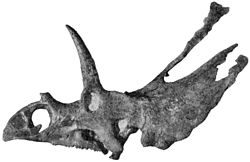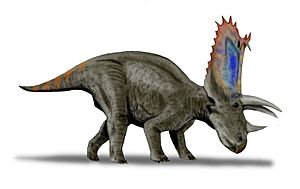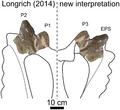Pentaceratops facts for kids
Quick facts for kids PentaceratopsTemporal range: Late Cretaceous
|
|
|---|---|
 |
|
| Skull of Pentaceratops sternbergii | |
| Conservation status | |
| Scientific classification | |
| Kingdom: | |
| Phylum: | |
| Class: | |
| Superorder: | |
| Order: | |
| Suborder: | |
| Infraorder: | |
| Superfamily: | |
| Family: | |
| Subfamily: |
Ceratopsinae
|
| Genus: |
Pentaceratops
Osborn, 1923
|
Pentaceratops was a huge plant-eating dinosaur. It belonged to a group called ceratopsians. These dinosaurs are famous for their horns and neck frills. Pentaceratops was about 11 meters (36 feet) long. It stood about 4 meters (13 feet) tall. This makes it even bigger than the well-known Triceratops!
What Pentaceratops Looked Like
Pentaceratops was a very large ceratopsid dinosaur. Scientists believe its body was around 6 meters (20 feet) long. Its skull alone could be over 2 meters (6.5 feet) long!
Horns and Frill
The nose horn of Pentaceratops was quite small. It pointed upwards and slightly backwards. Its brow horns, above its eyes, were very long. They curved strongly forwards, looking quite impressive.
The neck frill of Pentaceratops was much longer than Triceratops's frill. It tilted slightly upwards. This large frill had two big holes in it. These holes are called parietal fenestrae. The frill was shaped like a rectangle. It had large, triangular bony bumps along its edge. These bumps are called osteoderms. The biggest bumps were at the back corners of the frill. A large U-shaped notch was in the middle of the frill's back edge.
Body Shape
The body of Pentaceratops was tall and wide. Its back bones had long spines. These spines might have held strong tissues. These tissues could have helped balance its heavy frill. The hip bones were also quite long. In younger Pentaceratops, the thigh bone curved outwards.
Images for kids
See also
 In Spanish: Pentaceratops para niños
In Spanish: Pentaceratops para niños






